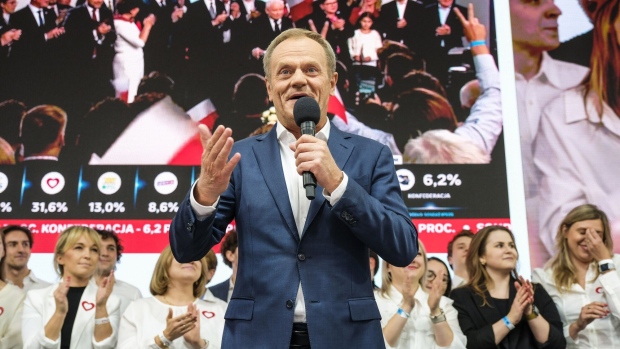Dec 11, 2023
Tusk Wins Vote to Become Poland’s Prime Minister in Pro-EU Shift
, Bloomberg News

(Bloomberg) -- Donald Tusk was appointed to be Poland’s prime minister, kicking off a delayed transfer of power to pro-European Union parties almost two months after they secured a surprise electoral victory.
The lower house of parliament, or Sejm, voted 248-201 on Monday to put forward Tusk, who has promised to end a conflict with the EU over the rule of law and restore access to almost €60 billion ($64.6 billion) in blocked financial aid. The former European Council president will address lawmakers on Tuesday before seeking a vote of confidence in his cabinet the same day.
Tusk’s return to power after eight years of nationalist rule is a bright spot for the EU, with political disruptors on the far right having a moment again, from the Netherlands to Viktor Orban’s Hungary. He’s taking over as relations with neighboring Ukraine have grown tense and inherits a budget with little room for pre-election spending pledges.
Hours earlier, Prime Minister Mateusz Morawiecki lost a vote of confidence in parliament, ultimately ending a doomed bid by the nationalist Law & Justice party to stay in power. President Andrzej Duda gave him the first shot at forming a government even after it became clear that the party fell well short of a majority despite winning the most votes in Oct. 15 election.
The limbo created by the process to appoint a premier has placed focus on the parliament. Its new speaker, Szymon Holownia, a former host of the “Got Talent” reality show, has captivated Poles. The number of subscribers watching parliamentary proceedings on YouTube has jumped to a quarter of a million views. A cinema in central Warsaw offering tickets to watch the session sold out.
Once he’s sworn in on Wednesday, Tusk will travel to Brussels for a summit meeting of EU leaders, where Hungary’s Orban has threatened to torpedo a €50 billion support package for Ukraine and a decision to open accession talks with Kyiv.
The new prime minister is also going to face an uphill battle trying to convince the EU to release blocked funds to Poland. Access would require the government to reverse some of the contested changes in the judiciary, a step that is likely to face a veto from Duda, former Law & Justice lawmaker.
Releasing the funds will be critical for Tusk to deliver on costly election promises, which include higher wages for teachers. In one of its last decisions, the outgoing government extended a zero tax rate on food, further limiting the scope to increase spending. Still, the new administration is unlikely to seek fiscal tightening before European and local elections next year.
Investors have poured cash into Polish assets since Oct. 15 ballot. Warsaw’s WIG20 stock index has jumped 17%, compared with a 2.5% advance by the MSCI emerging-market equities gauge. The zloty has strengthened nearly 5% against the euro, the most among its developing peers after the Chilean peso.
--With assistance from Wojciech Moskwa and Piotr Bujnicki.
©2023 Bloomberg L.P.








